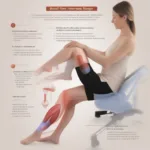Understanding Fixed Lingual Retainers
- AmazoniaSilva
- Tháng 12 13, 2024
- Zodiac signs
- 0 Comments
A Fixed Lingual Retainer, also known as a permanent retainer, is a thin wire bonded to the back of your teeth to keep them in their desired position after orthodontic treatment. This article provides a comprehensive overview of fixed lingual retainers, exploring their benefits, drawbacks, maintenance, and cost.
What are Fixed Lingual Retainers?
Fixed lingual retainers are typically made of thin, flexible metal wires, often stainless steel or a similar material. They are custom-fitted and bonded to the inside surface of your teeth, usually the lower front six. This discreet placement makes them virtually invisible. They work by preventing teeth from shifting back to their original position after braces or aligners are removed. This helps maintain the beautiful, straight smile you’ve worked hard to achieve.
Advantages of Fixed Lingual Retainers
One key benefit is their permanence. You don’t have to remember to wear them like removable retainers, eliminating the risk of losing them or forgetting to put them in. This is a significant advantage, especially for those who struggle with compliance with removable retainers. They are also exceptionally effective in preventing relapse, ensuring long-term orthodontic stability. This is crucial for maintaining the results of your orthodontic treatment. Fixed lingual retainers also require minimal maintenance compared to removable retainers.
Disadvantages of Fixed Lingual Retainers
While fixed lingual retainers offer many advantages, they also have some drawbacks. They can make oral hygiene slightly more challenging, requiring more meticulous brushing and flossing to prevent plaque buildup around the retainer. Some individuals may also experience initial discomfort or difficulty with speech, although this usually subsides as they adjust to the retainer. In rare cases, the retainer can break or become detached, requiring a visit to the orthodontist for repair.
Maintaining Your Fixed Lingual Retainer
Maintaining a fixed lingual retainer is crucial for its longevity and effectiveness. Regular brushing and flossing are essential to prevent plaque buildup and gum inflammation. Using interdental brushes can be particularly helpful for cleaning around the retainer wire. Regular checkups with your orthodontist are also recommended to monitor the retainer’s condition and address any potential issues.
How Much Do Fixed Lingual Retainers Cost?
The cost of a fixed lingual retainer can vary depending on factors such as the orthodontist’s fees, the materials used, and the complexity of the case. Typically, the cost is included in the overall cost of orthodontic treatment. However, if the retainer needs to be replaced or repaired, there may be additional charges.
“Fixed retainers offer an excellent solution for maintaining a straight smile after braces,” says Dr. Emily Carter, DDS, MSD, a renowned orthodontist in New York. “Their discreet nature and effectiveness make them a popular choice for many patients.”
Fixed Lingual Retainer FAQs
- How long do fixed retainers last? With proper care, fixed retainers can last for many years, even decades.
- Can you eat with a fixed retainer? Yes, you can eat normally with a fixed retainer, but it’s important to avoid hard, sticky, or chewy foods that could damage it.
- Are fixed retainers noticeable? Fixed retainers are placed on the back of the teeth, making them virtually invisible.
“Patients often appreciate the peace of mind that comes with a fixed retainer,” adds Dr. Carter. “They don’t have to worry about losing or forgetting their retainer, ensuring their investment in orthodontic treatment is protected.”
Conclusion
Fixed lingual retainers are a valuable tool for maintaining a straight smile after orthodontic treatment. They offer convenience, effectiveness, and discretion, making them a popular choice for many patients. While they have some potential drawbacks, the benefits often outweigh the risks. By understanding the pros and cons, maintenance requirements, and associated costs, you can make an informed decision about whether a fixed lingual retainer is the right choice for you.
Common Scenarios and Questions:
- My retainer feels loose. What should I do? Contact your orthodontist immediately. A loose retainer is not effective and could be swallowed.
- I’m having trouble flossing with my retainer. Any tips? Use a floss threader or interdental brushes specifically designed for cleaning around retainers.
Related Articles:
- Choosing the Right Retainer After Braces
- Caring for Your Teeth After Orthodontic Treatment
If you need assistance, please contact us at [email protected] or visit us at Fifth Avenue, 34th Floor, New York, NY 10118, USA. We have a 24/7 customer support team.

